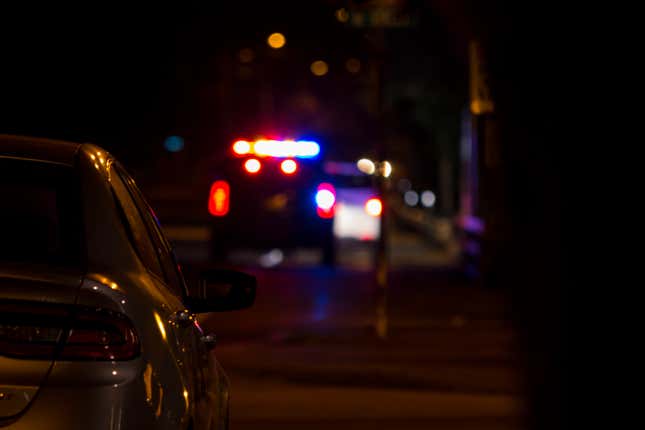
Racism.
That’s usually the answer to most questions involving the four sides of a square of fuckshit: a Black person, police, a Southern state and an arrest.
Don’t make that face with me. I didn’t make the rules.
The truth is that the truth is sometimes just that simple. Sometimes police pull Black people over for little to no reason and then arrest them because they are fucked up people. There really isn’t more to it.
Such is the case with Juanisha C. Brooks, a Black Department of Defense employee with top secret security clearance, who was driving home March 6, when a Virginia State Police trooper (think regular cop but with that wide hat and more of an asshole), stopped her for her taillights being out. When Brooks asked Trooper Robert G. Hindenlang why he had pulled her over, he refused to tell her. The dashcam shows that instead of answering Brooks’ question, he tells her she can get outside and he’d show her. When Brooks said she didn’t want to get out, the trooper unlocked her door and dragged her out. Brooks can be heard screaming loudly for the trooper to stop.
The trooper spun her against the car and handcuffed her. When Brooks refused to take a sobriety test, after telling the trooper she had had one drink, Hindenlang told her, “You’re under arrest for driving under the influence.”
From the Washington Post:
The trooper spun her against the car and handcuffed her. When Brooks refused to take a sobriety test, after telling the trooper she had had one drink, Hindenlang told her, “You’re under arrest for driving under the influence.”
“Why were your eyes so watery when I pulled up?” Hindenlang asked her.
“Why were my eyes watering?” Brooks answered the trooper. “Because people are being shot by the police, I’m freaking nervous.”
At the Fairfax County jail, Brooks and her attorney said, she twice took a breathalyzer test. The results: a 0.0 blood alcohol level. So Hindenlang charged her with resisting arrest, eluding police, failing to have headlights on and reckless driving.
Brooks said she had forgotten to turn her headlights on that night and hadn’t noticed on the brightly lit Beltway. The Virginia General Assembly banned pulling people over for dark taillights, effective March 1, because it led to the type of pretextual traffic stops that can cause unnecessary conflict and consequences for otherwise law-abiding citizens.
Brooks’ attorney Patrick M. Blanch got video of the arrest and gave that to Fairfax Commonwealth’s Attorney Steve Descano, who dismissed all charges and called for state police to conduct an internal investigation. In a letter to police, he said “the stop was without proper legal basis,” given the recent change in the law, and the “dashcam footage does not provide a factual basis to support the warrants.”
But of course, Corinne Geller, the spokeswoman for the Virginia State Police, defended the arrest, claiming that Brooks was driving “without any headlights or taillights, tailgating other vehicles and making unsafe lane changes, which are indicators of an impaired driver and provided reasonable suspicion for the trooper to initiate a traffic stop.” Geller told the Post that Brooks was taken into custody “due to her persistent refusal to comply with the trooper’s requests” and because the trooper believed that she was driving impaired.
She wasn’t. Didn’t matter because, racism.
“I’m nervous because I’ve seen so many of these interactions,” Brooks told the Post. “I was having a panic attack. … I felt to get out, I would be putting myself in danger.”
Brooks is a senior video producer for the DOD. She’s been there eight years. If the arrest had stuck, she could’ve lost her top secret clearance and possibly her job.
“My whole livelihood was on the line,” Brooks said. “You can’t have any charges when you have a clearance.” She added that the Defense Department questioned her about the arrest.
And if you didn’t believe that all of this was a racist encounter, then I’ll just let the Post tell it:
Brooks’s ordeal didn’t end with being charged, though. Hindenlang had ordered her car towed, and left her wallet and phone inside the car. After Brooks was released on a signature bond, she said she asked Hindenlang where her car was, and he gave her a Post-it note with the name of the tow lot in Lorton, but nothing else. Brooks said Hindenlang told her that her mother was waiting in the lobby and could help her. Brooks’s mother is deceased.
“Oh,” Hindenlang said, then shut the door on her and walked out, Brooks said.
And here is the inconvenience of being Black and dealing with racism when you’ve done nothing wrong:
A bondsman tried to help her contact friends, and eventually the magistrate in the jail sympathized with Brooks and drove her to the Vienna Metro station and gave her $20, Brooks said. The station wasn’t yet open, so she stood outside in the frigid darkness for an hour. It took a train ride, two bus trips and a cab ride for Brooks to reach the tow lot, where she said she was charged $240 to extricate her car. She arrived home around noon, almost 10 hours after Hindenlang stopped her.
I know...I know...why do I have to make everything about race when this could’ve just been a misunderstanding that played out on a bad day? But let’s just let Brooks have the last word.
“Would he have done that to a white woman? No,” Brooks said. “He didn’t see me as a human being. … This has to stop. It’s racism at its core, and it should be seen as such.”

